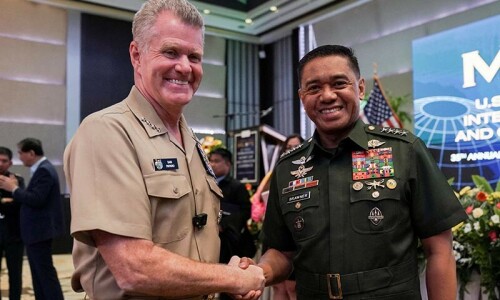BEIJING: US National Security Adviser Jake Sullivan and China’s top diplomat Wang Yi said they were hoping for productive talks as they met in Beijing on Tuesday.
After arriving at the Chinese capital, the top US diplomat said that he looked forward to “a very productive round of conversations” with foreign minister Wang.
“We’ll delve into a wide range of issues, including issues on which we agree and those issues... where there are still differences that we need to manage effectively and substantively,” he said.
Wang told Sullivan he was keen for “substantive” and “constructive” talks during his visit, the first to China by a US national security adviser since 2016.
He also said he wanted the two sides to “help China-US relations move forward towards the San Francisco vision”, referring to a framework hashed out by Presidents Joe Biden and Xi Jinping during talks in the US city last year.
While the talks are aimed at quieting tensions between the two superpowers ahead of the Nov 5 US election, Washington allies Japan and the Philippines have blamed China for raising regional tensions.
Japan expressed “serious concern” on Tuesday over recent developments in the South China Sea, accusing Beijing of “dangerous and coercive” actions. In a show of support for Manila, Japan said it “highly appreciates the Government of the Philippines for having... shown its commitment to the peaceful settlement of disputes” in the region.
An American official said ahead of the visit that Sullivan would discuss the disputed waterway with counterparts in Beijing. “We are committed to making the investments, strengthening our alliances, and taking the common steps on tech and national security that we need to take,” the official said, referring to sweeping restrictions on US technology transfers to China imposed under Biden.
“We are committed to managing this competition responsibly... and preventing it from veering into conflict,” she added, speaking on condition of anonymity.
Sullivan and Wang have met five times over the past year-and-a-half in Washington, Vienna, Malta and Bangkok, as well as alongside Biden and Xi at the summit in California.
Those meetings between Wang and Sullivan were sometimes announced only after they concluded and the two had spent long hours together behind closed doors.
Upon arrival in Beijing on Tuesday, Sullivan met first with Wang at a lush resort on the northern outskirts of the Chinese capital, where they shook hands in front of Chinese and American flags set before an artistic depiction of the Chinese landscape.
Twists and turns
In his remarks in front of journalists, Wang described China-US ties as “critical”, with a bearing on the world, and which have taken “twists and turns”.
Wang added that he hoped relations between the two countries would move to a condition of stable, healthy and sustainable development.
Before proceeding into a closed-door meeting, Sullivan said both would talk about areas of agreement and disagreement that “need to be managed effectively and substantively”.
In the final months of his presidency, Biden has pushed direct diplomacy to influence Chinese President Xi Jinping and keep those tensions at bay; US Vice President Kamala Harris, the Democratic candidate in November’s election, would likely pursue a similar strategy.
However, many analysts aligned with Donald Trump see that approach as too soft, in the face of China’s increasingly assertive foreign policy.
Sullivan wants to expand military-to-military talks down to the theater command level, a step that Washington hopes could prevent conflict in specific areas like the Taiwan strait.
The US also wants China to take more action at home to prevent the development of chemicals that can be made into fentanyl, the leading cause of US drug overdoses, and reach an understanding about safety standards for AI.
Beijing is expected to express its disapproval over US tariffs on a range of manufactured goods and export controls targeting Chinese chip makers, and talk about its claims of sovereignty over Taiwan.
Both sides are also warily watching the prospect that the Gaza war could spiral into a broader regional conflict.
Published in Dawn, August 28th, 2024














































Dear visitor, the comments section is undergoing an overhaul and will return soon.